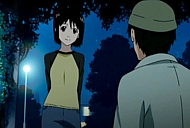
Welcome to the N.H.K. Vol. 1
I have to rethink my position on Gonzo. I never really got over the concept that they were the studio defined by violent and edge-pushing teen-oriented programming like Hellsing and Gantz. But my mind started to change a couple of weeks ago when I praised the the intriguing first volume of Red Garden, which impressed me with its unsettling storytelling and keen character insights. Now there's Welcome To The N.H.K., and despite all my expectations I am just floored. Edge-pushing? Absolutely. Welcome To The N.H.K. Vol. 1 is a no-holds-barred portrait of a man who, for all intents and purposes, has a mental illness. It's also a devastating but often hilarious portrait of the dark side of otaku and fandom life. But beyond all that, it's also surprisingly romantic and complex. Don't judge this show by its cover, for while it does have significant racy elements, this is a competitor for the best show I've seen this year.
Sato is a mess. Physically, emotionally, spiritually, he is a wreck of a human being. He is defined by Japanese society as a "NEET" and a "hikikomori" -- ultimately, those two terms mean that Sato is not engaged in any meaningful pursuits, and that he is homebound by choice. Sato hasn't always been this disturbed. Once upon a time, he went to school and was this close to having a real girlfriend. But one day as he was heading to one of his college classes, he got totally unnerved, ran home, and has been there ever since. He's convinced that there's a conspiracy to create homebodies like himself, and that conspiracy is headed up by none other than the N.H.K., a local TV station. Between sleeping 16 hours a day and wondering how the world is out to get him, Sato is just moments away from being diagnosed as a schizophrenic.
And then Misaki comes along. A beautiful girl who knocks on Sato's door as her crazy aunt distributes religious literature, she realizes his plight. What's more, she's convinced that she can rescue him. Luring him out to a local park -- the only place outside his apartment that Sato can relax and be himself -- Misaki hands him a contract. If he'll trust her, she'll lead him out of his dark life of solitude. But Sato can't admit his condition to himself, let alone Misaki, and so he says that he's a brilliant game creator...and she calls his bluff. Luckily for him, Sato's next-door-neighbor Yamazaki is an aspiring game designer who owes Sato from back in middle school. Problem is, Yamazaki has his own obsessions that Sato takes on as his own. And when the two decide the only way for Sato to redeem himself is to co-create a "gal game" -- basically a "choose your own adventure" where the right choices eventually lead to erotic encounters -- Sato pours himself into the project. Well, that's not exactly accurate...let's just say that he goes overboard on the research...and events devolve from there.
By the advertising copy and the suggestive photo on the front cover, Welcome To The N.H.K. Volume 1 is presented as if it's going to be the next revolution in wacky, fan-service-driven comedy. On the surface, one could get that impression, I suppose, but it takes just a moment to look past the surface and see all the layers of what's included in this show. The first thing that should be made clear is that this isn't a comedy in the traditional sense. In fact, the first two episodes are certainly amusing in their own way, but they are as much of a dramatic study into mental illness and OCD as they are laugh-aloud rib ticklers. Now that doesn't mean it doesn't get funny; episodes 3 and 4 in particular have some truly hysterical moments. But in NHK, we really get deep into the psyche of the main character for quite some time, and it's not a particularly happy place to be. Perhaps it's that seriousness that makes some of the in-jokes and satire all that more funny when they do come.
But if anything, NHK takes the time to make Sato more than a one-note stereotype of the otaku recluse. I genuinely rooted for him. Most of us who've been in anime or gaming culture for any length of time know people who have retreated into themselves and the worlds they enjoy. In my own heart of hearts, I know that I could become a Sato given the right conditions. As such, there was an instant connection for me, and I want him to win the girl, get out of the house, and even write the "gal game" of the century. Now one can hope that the character of Misaki will be more fully realized as the show progresses; right now, we really don't understand her motivations and why she's so interested in Sato. But even then, the show is so self-aware that it recognizes Misaki's purpose in the plot thus far and draws from that well as Sato and Yamazaki start creating their epic. And it's through her that I was able to most relate, wanting these characters to get past their own narcissistic compulsions. And frankly, it's so nice to watch a show that (up until the very end of episode 4) has only three main characters. The show walks us quickly through a lot of dark otaku obsessions, but we're always anchored in the personalities of our leads. In lesser hands, it could have come across either as creepy and gross or as impulsive silliness. NHK Vol. 1 never validates the piccadillos of Sato and Yamazaki, but it doesn't condemn them outright either.
In the past, I've complained about Gonzo's animation problems, and for a time I thought NHK was going to break the streak. For three episodes, it looks great. In the fourth episode, though, a segment in the middle of the episode looks different, and not in a good way. Save for that problem, it's more consistently good-looking than some of Gonzo's other shows, though no one is going to think this is a landmark either. The soundtrack is catchy and upbeat, and surprisingly enough it blends into the program perfectly. The closing song, meanwhile, is absolutely bizarre, spinning off from one of Sato's more lively paranoid dreams. Yet it works to make sure we're never too far from realizing that Sato is not completely balanced. Nothing about the technical aspects of the show distract from the presentation.
But what about the sexualized content of the series? My loyal readers know that I don't like fan service and rarely praise anything that's sexually provocative. As such, I want to make it clear that I'm not changing my views in the least. However, Welcome To The N.H.K. Vol. 1 is not your typical anime tease meant to titillate the audience. While there are flashes here and there, more straightforward nudity can be found in the recently reviewed Air Gear, which (sadly) is geared towards middle schoolers. And while the show has quite a few sexual themes on display, it's really about getting into the minds of these strangely sad characters who almost certainly have never had a real girlfriend or a truly intimate experience. Some people will be offended by the show, perhaps, and I understand that. But I see NHK (at this point, at least) as an anime for older teens and adults who can appreciate a show with dark humor and edgy subject matter that is still thoughtful and genuinely interested in its characters. Satoshi Kon is a master telling important stories through disturbing material, as Perfect Blue and Paranoia Agent proved. While I'm not ready to put NHK's creators in the same league, the show falls into a similar category.
What I've realized reading through what I've written is that I haven't quite put across just how much I truly enjoyed this show. Each episode added to the last, and episode 4 ends on the perfect cliffhanger. What's more, with all the curve balls thrown in this first volume, I have no clue where the show is going go, but I can hardly wait to find out. NHK Volume 2 can't come soon enough, as far as I'm concerned. So far, this is a great anime that happens to be a pitch black look at the underbelly of fandom that somehow still respects the denizens of that realm. It has touching moments and a little bit of romance to spare in the midst of it all. If you've been in fandom for a while and are an adult who can appreciate something way out of the ordinary, you need to make sure to sample this one.
Welcome To The N.H.K. Vol. 1 -- profanity, distant nudity, sexual and adult themes -- A

